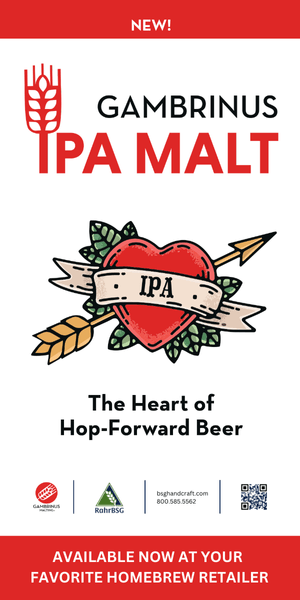Oakshire Brewing Co.’s Doppelbock clone
Oakshire Brewing Co.’s Doppelbock clone
(5 gallons/19 L, all-grain)
OG = 1.079 FG = 1.020
IBU = 16 SRM = 21 ABV = 7.8%
Doppelbock is one of our favorite brews to make each year. Ferment low and slow to ensure a very smooth and malt-forward beer that can withstand the high alcohol. Our trick is to first run off about a quarter of the wort and stop sparging. We then boil the highly concentrated wort for an hour to achieve the most out of the Maillard reactions of using a direct-fire kettle. We then finish our sparge and proceed with the rest of the recipe. After fermentation, the beer will remain in-tank undisturbed for about three months. We then transfer to our conditioning tank and carbonate. Shooting for a little higher on your carbonation will help offset some of the sweetness and make for a wonderful drinking experience for everyone around.
Ingredients
4.25 lbs. (2 kg) German Pilsner malt
11 lbs. (5 kg) German dark Munich malt (9 °L)
1.2 lbs. (544 g) CaraFoam® malt
11 oz. (312 g) CaraMunich® Type II malt
3 oz. (85 g) Carafa® Special III malt
7.5 AAU Herkules hops (90 min.) (0.5 oz./14 g at 15% alpha acids)
1 oz. (28 g) Saaz hops (0 min.)
Yeast nutrient (15 min.)
Whirlfloc (15 min.)
Wyeast 2000 (Budvar Lager), White Labs WLP802 (Czech Budejovice), Omega Yeast OYL-100 (Lager 1), or SafLager S-189 yeast
2⁄3 cup corn sugar (if priming)
Step by step
This is a single infusion mash, utilizing a grain-to-water ratio of 1.5 qts./lb. (3.1 L/kg). Add 1 tsp. calcium carbonate if using soft or reverse osmosis water. Target a mash temperature of 150 °F (66 °C) and hold for 60–90 minutes. Begin recirculation, then raise temperature to 168 °F (76 °C) for mash out and hold for 10 minutes. Begin sparging and, if possible, run the first 1.5 gallons (5.7 L) to a separate kettle and boil it down into a thin syrup. Continue to sparge, collecting another 7 gallons (26.5 L) in your kettle. Total boil time is two hours adding hops, yeast nutrients, and kettle fining per the ingredients list.
At the end of the boil, combine the two worts with the goal being that there is 5.5 gallons (21 L) of chilled wort in your fermenter. Chill to 50 °F (10 °C) and pitch a big starter or three packets of dried yeast. Repitching yeast from a smaller lager may be a great idea for a big lager like this. Also be sure to aerate/oxygenate the wort if repitching or using a liquid yeast strain. Ferment for 2–3 weeks at 52 °F (11 °C). Once signs of fermentation have ceased and final gravity has been achieved rack into a secondary vessel, such as a Corny keg, and lager at near-freezing temperatures for 2–3 months. Keg and force carbonate to 2.4 v/v or prime and bottle condition (consider adding a bottle conditioning yeast strain).
Oakshire Brewing Co.’s Doppelbock clone
(5 gallons/19 L, extract with grains)
OG = 1.079 FG = 1.020
IBU = 16 SRM = 21 ABV = 7.8%
Ingredients
2 lbs. (0.9 kg) Pilsen dried malt extract
6 lbs. (2.7 kg) Munich dried malt extract
1.2 lbs. (544 g) CaraFoam® malt
11 oz. (312 g) CaraMunich® Type II malt
3 oz. (85 g) Carafa® Special III malt
7.5 AAU Herkules hops (90 min.) (0.5 oz./14 g at 15% alpha acids)
1 oz. (28 g) Saaz hops (0 min.)
Yeast nutrient (15 min.)
Whirlfloc (15 min.)
Wyeast 2000 (Budvar Lager), White Labs WLP802 (Czech Budejovice), Omega Yeast OYL-100 (Lager 1), or SafLager S-189 yeast
2⁄3 cup corn sugar (if priming)
Step by step
Begin with 5 gallons (19 L) of water in the brew kettle and submerge crushed grains placed in a muslin bag. Steep grains as the water heats up to about 170 °F (77 °C) then remove grains, allowing the liquid to drip back into the kettle. Turn off the heat and add half the dried malt extract and first hop addition then bring wort up to a boil. Boil for 60 minutes, adding the yeast nutrients, kettle fining, and remaining malt extract with 15 minutes remaining in the boil. Add the second hop addition after the heat is turned off.
Chill wort to 50 °F (10 °C) then transfer to your fermenter. The goal is to have 5.25 gallons (20 L) of wort. Pitch a big starter or three packets of dried yeast. Follow the remainder of the all-grain recipe.
Written by Dan Russo

Doppelbock is one of our favorite brews to make each year. Ferment low and slow to ensure a very smooth and malt-forward beer that can withstand the high alcohol.



